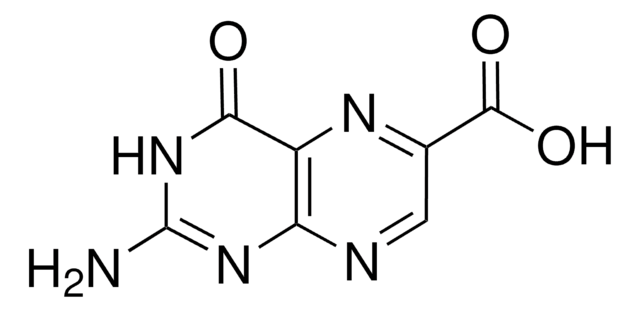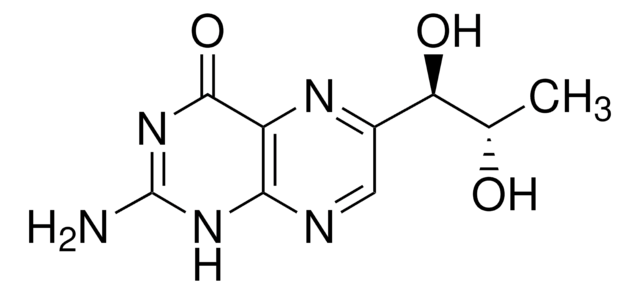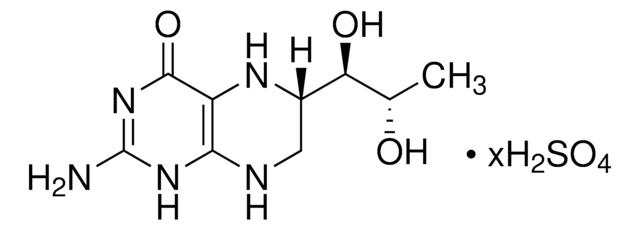P1132
Pterine
~95%
Synonym(s):
2-Amino-4-hydroxypteridine, 2-Amino-4-oxodihydropteridine
Sign Into View Organizational & Contract Pricing
All Photos(1)
About This Item
Empirical Formula (Hill Notation):
C6H5N5O
CAS Number:
Molecular Weight:
163.14
Beilstein:
150294
EC Number:
MDL number:
UNSPSC Code:
12352202
PubChem Substance ID:
NACRES:
NA.77
Recommended Products
biological source
synthetic
Quality Level
Assay
~95%
form
powder
storage temp.
2-8°C
SMILES string
Nc1nc(O)c2nccnc2n1
InChI
1S/C6H5N5O/c7-6-10-4-3(5(12)11-6)8-1-2-9-4/h1-2H,(H3,7,9,10,11,12)
InChI key
HNXQXTQTPAJEJL-UHFFFAOYSA-N
Looking for similar products? Visit Product Comparison Guide
Application
Pterine has been used:
- in photochemicals assay for inducing DNA damage
- as a substrate in xanthine oxidase assay
- as a standard in thin layer chromatography (TLC) for quantifying pterine from microbes
Biochem/physiol Actions
Pterine consists of pyrazine and pyrimidine with substitutions in keto and amino group. Pterine is present in all organisms including cyanobacteria. It acts as a cofactor for redox enzymes and serves as a precursor for folic acid synthesis. Pterine from the butterfly wings absorb light and elicit incoherent scattering. Pterine induces alterations in DNA by hydroxylation of deoxyguanosine.
Signal Word
Warning
Hazard Statements
Precautionary Statements
Hazard Classifications
Eye Irrit. 2 - Skin Irrit. 2 - STOT SE 3
Target Organs
Respiratory system
Storage Class Code
11 - Combustible Solids
WGK
WGK 3
Flash Point(F)
Not applicable
Flash Point(C)
Not applicable
Personal Protective Equipment
dust mask type N95 (US), Eyeshields, Gloves
Choose from one of the most recent versions:
Already Own This Product?
Find documentation for the products that you have recently purchased in the Document Library.
Customers Also Viewed
Febuxostat, an inhibitor of xanthine oxidase, suppresses lipopolysaccharide-induced MCP-1 production via MAPK phosphatase-1-mediated inactivation of JNK
Nomura J, et al.
PLoS ONE, 8(9), e75527-e75527 (2013)
Colors and pterin pigmentation of pierid butterfly wings
Wijnen B, et al.
Journal of Insect Physiology, 53(12), 1206-1217 (2007)
Pterin function in bacteria
Feirer N and Fuqua C
Pteridines, 18(1), 23-36 (2017)
Andrea Sariego-Jamardo et al.
Pediatric neurology, 53(5), 422-426 (2015-10-18)
The mechanisms of the ketogenic diet remain unclear, but several predictors of response have been proposed. We aimed is to study the relationship between the etiology of epilepsy, cerebrospinal fluid neurotransmitters, pterins, and amino acids, and response to a ketogenic
C l'Hélias et al.
Mutation research, 128(2), 147-152 (1984-09-01)
The experiments described in this paper show that synthetic pteridines, especially biopterin and pterin, injected directly into Drosophila melanogaster induce recessive lethals. On the contrary, D-neopterin seems to have little effect. A mutagenic effect has previously been shown for an
Our team of scientists has experience in all areas of research including Life Science, Material Science, Chemical Synthesis, Chromatography, Analytical and many others.
Contact Technical Service










![4-(N-[2,4-Diamino-6-pteridinylmethyl]amino)benzoic acid sodium salt ≥95% (TLC)](/deepweb/assets/sigmaaldrich/product/structures/855/619/06a9574b-3e45-48aa-85c1-2f25917fa5a7/640/06a9574b-3e45-48aa-85c1-2f25917fa5a7.png)


